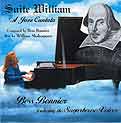
 |
|
|
 |
 |
|
|
 |
![]()
Index
of SEMJA reviews
Trumpeter
Louis Smith has been recording regularly for SteepleChase over
the years and each release has found him in a different musical environment.
With the exception of one quartet date, he has led quintets — using
the classic  front
line of sax and trumpet, albeit with differing personnel. His lovely new
release, Once in a While (Steeplechase
SCCD 31464), finds him in a novel setting: guitar, bass, and drums.
front
line of sax and trumpet, albeit with differing personnel. His lovely new
release, Once in a While (Steeplechase
SCCD 31464), finds him in a novel setting: guitar, bass, and drums.
Guitarist Doug Raney, a Steeplechase regular, turns out to be a perfect companion for Smith. Both musicians share an affection for a laid back version of bebop phrasing and seem to like the same kinds of harmonies. Although they had not met before the recording session, their empathy would make one think that they have been playing together for many moons. Smith has not sounded this good in years. He has had some embouchure problems in recent years, but these have been solved, and his tone is now sure and direct. For this date he chose to stick to tunes that he has worked on for years, mainly standards and bop classics such as "Tune Up" and "Sandu." The tempos are relaxed and the mood celebratory rather than explanatory. Bassist Hugo Rasmussen contributes some nice solos as well as laying a solid foundation, and drummer Keith Copeland plays a relaxed, unobtrusive manner that fits right in.
This is tasteful modern jazz without pyrotechnics, subdued but emotionally charged, with many little pleasures to be found in the solos and the interaction between trumpet and guitar.
Paul Klinger
is one of those rare musicians who, like Benny Carter or Ira Sullivan,
are equally at home on brass and woodwinds. Every Monday night Klinger
can be heard playing baritone and  soprano
sax in the Bird of Paradise Orchestra in Ann Arbor, and on Fridays he
can be heard on cornet and soprano sax in a more traditional context at
the Bird. His East Street Jazz Band has been together for almost
three decades, with varying personnel, and they have now put out Traditional
Jazz Live at the Bird of Paradise (BOPO
Records 120198).
soprano
sax in the Bird of Paradise Orchestra in Ann Arbor, and on Fridays he
can be heard on cornet and soprano sax in a more traditional context at
the Bird. His East Street Jazz Band has been together for almost
three decades, with varying personnel, and they have now put out Traditional
Jazz Live at the Bird of Paradise (BOPO
Records 120198).
This is exuberant, happy jazz played in a historically correct manner without pedantry. Three quarters of the tunes were composed before 1930 by classic musicians such as Jelly Roll Morton, King Oliver, and Irving Berlin. Chris Smith, who seems able to solo with conviction in any style, plays idiomatic soulful trombone, Ted Harley walks the bass, and Cary Kocher shares the drum duties with Pete Siers. Mike Jones has a perfect command of New Orleans clarinet playing, shining in solo and ensemble passages, the leader impresses on both his horns, and singer Susan Chastain adds icing to the cake. Pianist James Dapogny keeps it all together with his powerful two-handed playing. The secret to this kind of playing is the collective spirit, and in this band everyone contributes equally to the proceedings. Ann Arbor often seems to be a bop town, so it is nice to know that older forms of jazz are alive and well in the city.
Detroit's Bess Bonnier is known primarily for her excellent modern jazz piano
playing and for her occasional vocals. Her new CD demonstrates that she
is also an accomplished composer. On Suite William: A Jazz Cantata
(Noteworks Records 104) she offers
thirteen compositions  written
to the words of William Shakespeare. In keeping with the quality of the
lyrics, she has chosen to surround herself with a first-rate group of
musicians: Paul Finkbeiner (trumpet), George Benson (tenor and soprano
sax), Russ Miller (flute), Cary Kocher (vibes, congas), Paul Keller (bass),
and Peter Siers (drums).
written
to the words of William Shakespeare. In keeping with the quality of the
lyrics, she has chosen to surround herself with a first-rate group of
musicians: Paul Finkbeiner (trumpet), George Benson (tenor and soprano
sax), Russ Miller (flute), Cary Kocher (vibes, congas), Paul Keller (bass),
and Peter Siers (drums).
I must admit that I had my suspicions about this project, but the music won me over very quickly. Miss Bonnier avoids the obvious, does not offer overdone pathos, and seems to treat the Bard with a mixture of respect, affection, and irreverence, with a dollop of humor. One play fragment gets a calypso treatment, another is done in Horace Silver style, while a third one is set to waltz time. The Sugarhouse Voices blend well, and excel on an a cappella version of "How Sweet the Moonlight" (from Merchant of Venice). The focus here is on words and melodies, but much of the success of the CD is due to the splendid solos of Finkbeiner, Benson, Miller and Kocher. The music was written to work as a suite, but there is one tune here that should become a classic: Bonnier's musical setting of Sonnet XVIII, "Shall I Compare You to A Summer's Day." The track begins with the composer alone at the piano, soon joined by singer Judie Cochill, whose simple direct delivery is just right. Eventually Keller's bass joins the two. Benson on tenor sax and Bonnier offer apposite solos, and all three musicians accompany Cochill on a reprise of the last verse.
There is an effortless beauty to all of this that can only come from musicians of this stature. The melody is deceptively simple: the first few notes seem taken from Tadd Dameron's "If You Could See Me Now," but this turns out only to be a vague inspiration and the harmony and the musical line follow into another direction. The words and music fit so well it is difficult to imagine that they have been separated by the same language and hundreds of years.